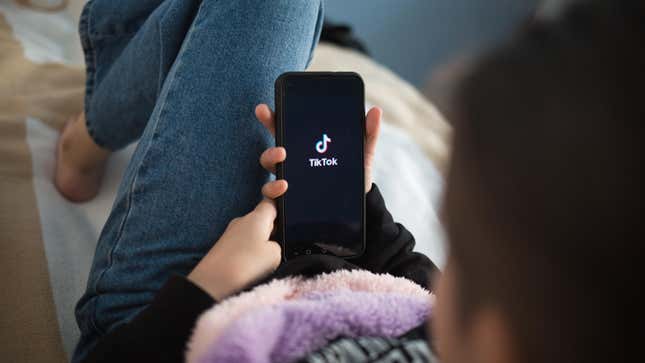
Have you ever used TikTok for such a long time that you felt like your brain was going to melt and leak out of your ears? Well TikTok now has a plan (albeit certainly not foolproof) to prevent teens and children using the app from endlessly scrolling. In the next few weeks, all users under 18 years old will receive a 60-minute screen time limit automatically set by the app that can only be unlocked with a passcode.
TikTok announced the feature today, and is the first to admit that the 60-minute time limit is a little bit arbitrary. However, the company claims that the decision is based on research from and consultations with the Digital Wellness Lab at Boston Children’s Hospital. Once users between 13 and 18 reach the one hour time limit, they will be prompted to enter a self-set passcode to unlock extra time. While this is an easy workaround, TikTok says that it will force teen users to make an active decision in their content consumption. For users under 13, a parent or guardian must set the passcode.
The feature will roll out “in the coming weeks,” according to TikTok’s press release, but, when asked, TikTok did not tell Gizmodo when, specifically the one-hour time limit will be released.
Of course, this all comes as lawmakers both on the state and federal levels are banning access to the ByteDance-owned app on government-issued devices, amid ongoing privacy concerns about the China-based company. It also comes as Republican-backed legislation to ban TikTok nationwide makes moves through Congress.
Senator Josh Hawley is one of the loudest lawmakers calling for an all out ban of the app. Upon introducing legislation to ban it in January, the Republican wrote that TikTok, “...threatens our children’s privacy as well as their mental health.”
While those following along don’t see a nationwide ban actually happening, it would be hard not to see TikTok’s latest move to curb screen time for kids as merely an effort to get lawmakers to ease up on calls to block access to the app.
That’s not to say that social media platforms like TikTok aren’t impacting kids. They certainly are. A survey from the Boston Children’s Hospital’s Digital Wellness Lab of over 1,400 teens found that 64% of respondents said that their screen usage interfered with sleep, while 52% said it interfered with family time. The survey also found that TikTok was the second most popular app being used by the teens that were canvassed, with 64% of teens using it at least once a day.
Obviously, Gen Z loves TikTok, but the impacts of the app—and social media more broadly—amongst the younger generations are becoming harder and harder to ignore. Earlier this year, the Seattle school system sued several social media companies, including Facebook, Instagram, Snapchat and (you guessed it) TikTok, arguing that these platforms have helped foster a youth mental health epidemic.